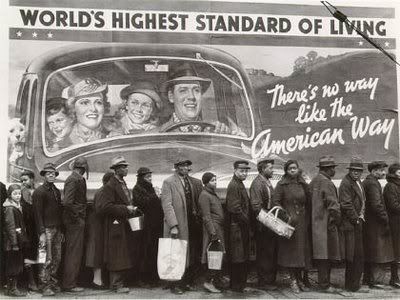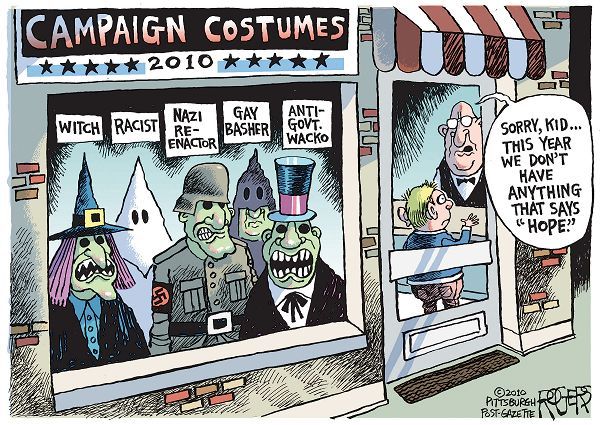So yesterday I highlighted Black and Wray’s counter response to Bank of America and today Part 2 is available, but before I get to that I’d like to provide some context.
You’ll remember that PIMCO, Blackrock, Freddie Mac, and The Federal Reserve Bank of New York had requested that Bank of America repurchase some $47 Billion Mortgage Backed Securities that violated the performance and disclosure provisions of the contracts they were sold under. You might also recognize these names as financial players every bit as big and powerful as Bank of America itself.
Well, yesterday BoA rejected that request. As Atrios says- It’s On.
But you shouldn’t think that Bank of America is the only one with these problems. Although it is the biggest, JPMorgan Chase & Co, Wells Fargo & Co, Citigroup Inc, US Bancorp and PNC Financial Services Group have $43 Billion or more in exposure to the same types of losses.
While some of Black and Wray’s Part 2 touches on that exposure, what it’s mostly about is the story of Bank of America’s purchase of Countrywide Financial.
An interesting factoid about BoA’s purchase of Countrywide (from the Jonathan Weil, Bloomberg article cited yesterday)-
Here’s how Bank of America allocated the purchase price for that deal. First, it determined that the fair value of the liabilities at Countrywide exceeded the mortgage lender’s assets by $200 million. Then it recorded $4.4 billion of goodwill, a ledger entry representing the difference between Countrywide’s net asset value and the purchase price.
That’s right. Countrywide’s goodwill supposedly was worth more than Countrywide itself. In other words, Bank of America paid $4.2 billion for the company, even though it thought the value there was less than zero.
Since completing that acquisition, Bank of America has dropped the Countrywide brand. The company’s home-loan division has reported $13.5 billion of pretax losses. Yet Bank of America still hasn’t written off any of its Countrywide goodwill.
What genius! Surely these Masters of the Universe are worth every penny they’re paid, but, it being a free market capitalist system and all, I can’t help myself from pointing out that I personally am willing to lose $17.7 Billion for a much more reasonable rate of compensation. Since they’re great believers in the efficiency of markets I expect an offer any time.
Let’s Set the Record Straight on Bank of America, Part 2: Eliminating Foreclosure Fraud
William K. Black and L. Randall Wray, The Huffington Post
Posted: November 5, 2010 01:23 PM
Bank of America did not purchase Countrywide for the good of the public. It purchased a notorious lender to feed the ego of their CEO, who wanted to run the biggest bank in America rather than the best bank in America. They certainly knew at the time of the purchase that is was buying an institution whose business model was based on fraud, and it had to have known that a substantial portion of Countrywide’s assets were toxic and fraudulent (since Bank of America’s own balance sheet contained similar assets and it could reasonably expect that Countrywide’s own standards were even worse). The response does not contest the depth of the bank’s insolvency problems should it be required to recognize its liability for losses caused by its frauds.
…
Bank of America’s response to our articles ignores its foreclosure fraud, which we detailed in our articles. News reports claim that the bank sent a 60 person “due diligence” team into Countrywide for at least four weeks. The Countrywide sales staff were notorious, having prompted multiple fraud investigations by the SEC and various State attorneys general. The SEC fraud complaint against Countrywide emphasized the games it played with the computer system. Countrywide had a terrible reputation for its nonprime lending. Nonprime loans were already collapsing at the time of the due diligence, the FBI had warned about the epidemic of mortgage fraud, and the lending profession’s anti-fraud firm had warned that liar’s loans were endemically fraudulent. Is it really possible that Bank of America’s due diligence team missed all of this and that the CEO thought even months later that the Countrywide lending personnel and Countrywide’s computer systems were exceptionally desirable assets?
…
As we explained, fraud begets fraud. Bank of America created over $4 billion in “goodwill” and placed it on its books as an asset when it paid money to acquire Countrywide at a time when it was deeply insolvent on a market value basis. Instead of acquiring an asset, they got thousands of fraudulent employees and officers, a failed computer system and catastrophic losses. So, we have a question for Bank of America, its auditors, and the SEC: why haven’t you written off that entire goodwill account?
And why aren’t people in jail or bankrupted by shareholder and bondholder lawsuits (yet)?
Obama’s Problem Simply Defined: It Was the Banks
James K. Galbraith, The Huffington Post
Posted: November 5, 2010 04:16 PM
(O)ne cannot defend the actions of Team Obama on taking office. Law, policy and politics all pointed in one direction: turn the systemically dangerous banks over to Sheila Bair and the Federal Deposit Insurance Corporation. Insure the depositors, replace the management, fire the lobbyists, audit the books, prosecute the frauds, and restructure and downsize the institutions. The financial system would have been cleaned up. And the big bankers would have been beaten as a political force.
Team Obama did none of these things. Instead they announced “stress tests,” plainly designed so as to obscure the banks’ true condition. They pressured the Federal Accounting Standards Board to permit the banks to ignore the market value of their toxic assets. Management stayed in place. They prosecuted no one. The Fed cut the cost of funds to zero. The President justified all this by repeating, many times, that the goal of policy was “to get credit flowing again.”
…
With free funds, the banks could make money with no risk, by lending back to the Treasury. They could boom the stock market. They could make a mint on proprietary trading. Their losses on mortgages were concealed — until the fact came out that they’d so neglected basic mortgage paperwork, as to be unable to foreclose in many cases, without the help of forged documents and perjured affidavits.
But new loans? The big banks had given up on that. They no longer did real underwriting. And anyway, who could qualify? Businesses mostly had no investment plans. And homeowners were, to an increasing degree, upside-down on their mortgages and therefore unqualified to refinance.
…
To counter calls for more action, Team Obama produced sunny forecasts. Their program was right-sized, because anyway unemployment would peak at 8 percent in 2009. So Larry Summers said. In making that forecast, the Obama White House took responsibility for the entire excess of joblessness above eight percent. They made it impossible to blame the ongoing disaster on George W. Bush. If this wasn’t rank incompetence, it was sabotage.
Remember “Recovery Summer(s)“? Nothing has changed. And until people go to jail for their fraud and the “To Big To Fail” Banks are placed into FDIC Receivership, their incompetent management tossed out on their asses, and broken up, nothing will.
Barack Hussein Obama and the Democratic Party have no one to blame but themselves.

 Rob Johnson is the Director of the Economic Policy Initiative at the Franklin and Eleanor Roosevelt Institute and is a regular contributor to the Institute’s blog NewDeal2.0. He serves on the UN Commission of Experts on Finance and International Monetary Reform. Previously, Dr. Johnson was a Managing Director at Soros Fund Management where he managed a global currency, bond and equity portfolio specializing in emerging markets. He was also a Managing Director at the Bankers Trust Company. Dr. Johnson has served as Chief Economist of the US Senate Banking Committee under the leadership of Chairman William Proxmire and was Senior Economist of the U.S. Senate Budget Committee under the leadership of Chairman Pete Domenici. Dr. Johnson was an Executive Producer of Taxi to the Dark Side, an Oscar Winning documentary produced and directed by Alex Gibney.
Rob Johnson is the Director of the Economic Policy Initiative at the Franklin and Eleanor Roosevelt Institute and is a regular contributor to the Institute’s blog NewDeal2.0. He serves on the UN Commission of Experts on Finance and International Monetary Reform. Previously, Dr. Johnson was a Managing Director at Soros Fund Management where he managed a global currency, bond and equity portfolio specializing in emerging markets. He was also a Managing Director at the Bankers Trust Company. Dr. Johnson has served as Chief Economist of the US Senate Banking Committee under the leadership of Chairman William Proxmire and was Senior Economist of the U.S. Senate Budget Committee under the leadership of Chairman Pete Domenici. Dr. Johnson was an Executive Producer of Taxi to the Dark Side, an Oscar Winning documentary produced and directed by Alex Gibney.
Recent Comments